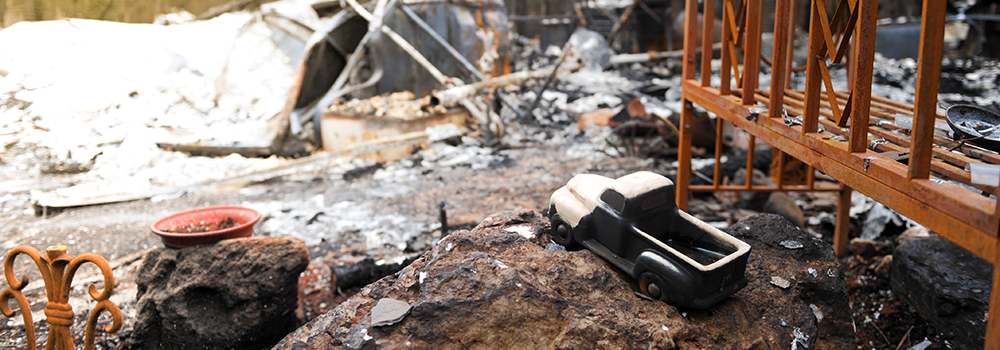 A child’s toy sits amidst the destruction caused by the Camp Fire in Paradise, California. ©Robert Barker, 2018.
A child’s toy sits amidst the destruction caused by the Camp Fire in Paradise, California. ©Robert Barker, 2018.
As a series of devastating wildfires raged through California late last year, the Natural Hazards Center Quick Response Grant Program made special funds available to collect perishable data that would shed light on their impacts. The following research projects were funded:
Exploring the Legacy of Frequent Wildfires in Northern California on Recovery Organization Response to the 2018 Camp Fire
Catrin Edgeley,University of Idaho
This study will investigate the influence of several recent large fires in northern California and how they affected the responses of recovery organizations to the 2018 Camp Fire. Research will explore how past fires influenced interactions between organizations and determined the organizational ability to respond to short-term recovery needs. Findings will produce recommendations for incorporating the social legacies of past hazards into short-term recovery assistance.
Impacts to Engineered Facilities Caused by the California Camp Fire
Erica Fischer, Oregon State University
Hussam Mahmoud, Colorado State University
Sara Hamideh, Iowa State University
The California Camp Fire caused significant damage to Butte County, California, and particularly to the town of Paradise. This research will examine and assess the performance of critical infrastructure in this wildfire and the mitigation techniques that were implemented before the fire. The results of this study will inform recommendations for codes and standards improvements to future mitigation techniques to prevent damage to critical infrastructure within a community.
Resilience Under Fire: Attitudes and Behaviors of Those Who Chose to “Stay and Defend” in the Woolsey Fire
Steven Jensen, California State University, Long Beach
Shirley Feldmann-Jensen, California State University, Long Beach
Brent Woodworth, Los Angeles Emergency Preparedness Foundation
Terri Pond, Los Angeles Emergency Preparedness Foundation
The Woolsey Fire was an event that can further understanding of future fire scenarios. Many people made the decision to stay and defend homes and businesses. As Malibu, and more broadly California, looks toward building more resilient communities, the attitudes and behaviors of people who were able to stay and defend properties during the fire are important to understand. More specific inquiry will explore whether this action is framed within institutional policy and practice.
Collective Action in Communities Exposed to Recurring Hazards: The Camp Fire, Northern California
Kenichi Soga, University of California, Berkeley
Louise Comfort, University of Pittsburgh
Mark Stacey, University of California, Berkeley
Millard McElwee, University of California, Berkeley
This research will map the discrepancy between the technical communication infrastructure available to community residents and the organizational and informal social networks through which information flowed immediately before, during, and after the Camp Fire in Northern California. Researchers will use a mix of methods to identify the physical, organizational, and informal social systems that operated in this event. Findings will be used to model alternative sociotechnical systems to activate collective action in communities exposed to recurring risk.
Grantees deliver a report of no more than 12 pages that outlines their initial observations to the Center within 90 days, so what they learn is available everyone.
This research is supported by the National Science Foundation under grant no. 1635593. Any opinions, findings, and conclusions or recommendations expressed in this material are those of the authors and do not necessarily reflect the views of the National Science Foundation.
Those interested can learn more about the program and read past reports on the Natural Hazards Center Quick Response page.